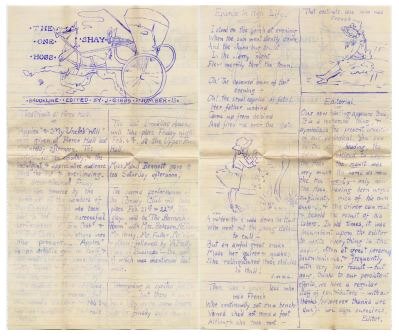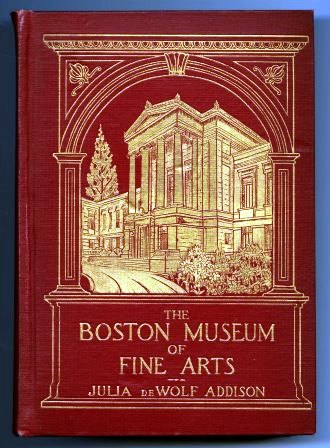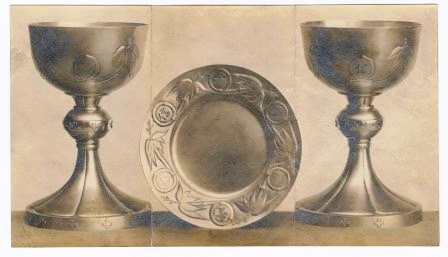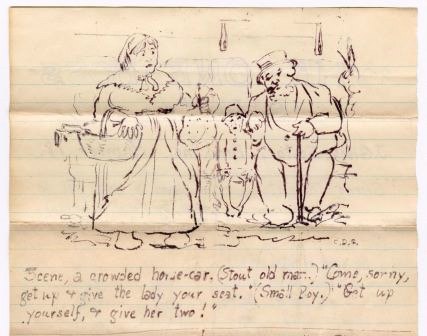By Susan Martin, Collection Services
The Massachusetts Historical Society recently received a donation of William Gray Brooks family papers, primarily correspondence on genealogical subjects. It’s a terrific collection of letters from some of the leading lights of the 19th century, including Charles Francis Adams, Edward Everett, Henry Wadsworth Longfellow, Eliza Susan Quincy, and many others. This new acquisition complements other MHS collections related to Brooks and his family.
I was intrigued, however, by additional material that came to us as part of the collection, namely 22 issues of a family “newspaper” called “The One Hoss Shay.” The newspapers were handwritten by J. Gibbs of Brookline, Mass. and reproduced on a hectograph.

“The One Hoss Shay” contains light-hearted poems, stories, illustrations, jokes, announcements, reviews, etc., written by Gibbs and others, and it makes for some very fun reading. Here’s one of the better limericks:
There was a young man of Bombay
Excessively fond of croquet,
But when he got beat,
He would beat a retreat
And show himself no more that day.
Sandwiched between articles are editorial asides by Gibbs.
We wish to apologise for the condition of our hectograph, which absolutely refuses to print well. We are not responsible for it’s [sic] freaks.
If the “Shay” should chance to seem too local for general interest, we call attention to the fact that the more we heard from elsewhere, the more foreign news could be introduced. (Hint.)
Who was the mysterious J. Gibbs of Brookline? Unfortunately, the “Shay” provides very few clues. She was a “Miss,” and I eventually found her first name: Julia. The newspapers were written between 1886-1888, which probably meant she was born in the 1860s or early 1870s. Her family apparently summered in Marion, Mass. These were the only biographical details I could find or infer.
I guessed that because the newspapers accompanied the Brooks letters, and because some Brooks family members are mentioned in Julia’s articles, she may have been a relative. It was easy enough to find Brooks genealogies, given how famous the family is. (William Gray Brooks’ son Phillips, for example, was one of Boston’s most renowned clergymen.) But there was no sign of a Gibbs among William’s siblings or cousins or their children or grandchildren.
I went back to the collection for more information and noticed a reference to “Harriette Brooks Hawkins (Mrs. Hubert A.) […] (a granddaughter of W.G.B.).” Born in 1881, Harriette was the daughter of William’s youngest son John Cotton Brooks and his wife Harriette Hall (Lovett) Brooks. She owned the Brooks letters in 1935, but had she also owned the newspapers? Did she have a connection to Julia Gibbs?
Armed with a few more keywords, I took one last crack at an online search for Julia and finally found her: Julia de Wolf Gibbs (1866-1952), later Mrs. Addison. The name was right, the age was right, and the location was right—she is buried in Marion, Mass. So what was her connection to Harriette and/or William Gray Brooks? I got my answer when I identified her parents: Julia’s mother was Anne (or Anna) de Wolf (Lovett) Gibbs. Her mother and Harriette’s mother were sisters.
Out of curiosity, I searched our catalog for Julia and was excited to learn that she later became not only a published author…

But also a designer of metalwork, ornamentation, etc. Some photographs of her work appear in one of our collections.

“The One Hoss Shay” was the brainchild of a creative young woman at the start of her career. Julia apparently took the title of her newspaper from Oliver Wendell Holmes’ 1858 poem “The Deacon’s Masterpiece, or the Wonderful ‘One-Hoss Shay’: A Logical Story.” In her third issue, she wrote that she and her aunt Harriette attended Holmes’ recitation of the poem at Harvard’s Sanders Theatre. This was her one-line review: “Our Patron Poet was quite at his best.”
(Incidentally, Julia’s future husband also earned a passing mention in one issue: “Rev. Daniel Dulany Addison is in Washington.”)
I’d be remiss if I didn’t say more about the newspaper’s impressive illustrations. Some were drawn by Julia herself, such as the seated girl on the right side of the first image above. Others were contributed by another of her cousins, “our popular artist, Mr. C. Dana Gibson.” If that name sounds familiar to you, it’s because Charles Dana Gibson went on to become one of the most popular illustrators in America and creator of the iconic turn-of-the-century Gibson Girl. He designed the letterhead for the “Shay” and provided drawings like this one:

Scene, a crowded horse-car. (Stout old man.) “Come, sonny, get up & give the lady your seat.” (Small Boy.) “Get up yourself, & give her two!”
For more about Gibson, I recommend the 1936 biography Portrait of an Era, which contains hundreds of his beautiful illustrations.

